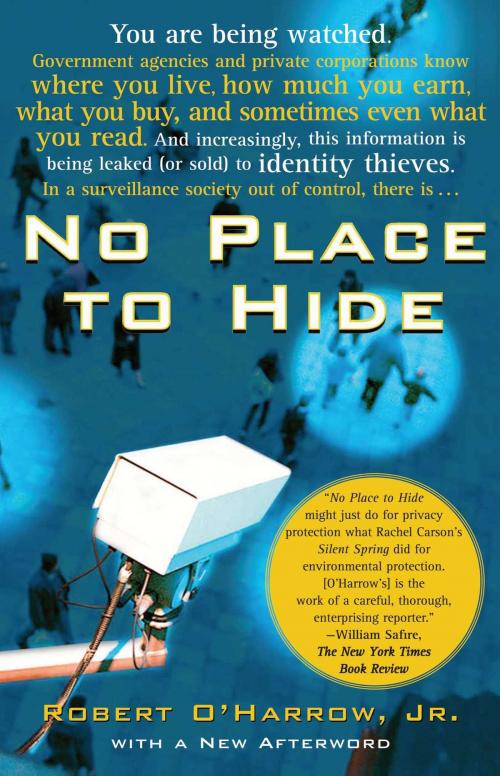| Author: | Robert O'Harrow Jr. | ISBN: | 9780743276597 |
| Publisher: | Free Press | Publication: | January 12, 2005 |
| Imprint: | Free Press | Language: | English |
| Author: | Robert O'Harrow Jr. |
| ISBN: | 9780743276597 |
| Publisher: | Free Press |
| Publication: | January 12, 2005 |
| Imprint: | Free Press |
| Language: | English |
In No Place to Hide, award-winning Washington Post reporter Robert O'Harrow, Jr., lays out in unnerving detail the post-9/11 marriage of private data and technology companies and government anti-terror initiatives to create something entirely new: a security-industrial complex. Drawing on his years of investigation, O'Harrow shows how the government now depends on burgeoning private reservoirs of information about almost every aspect of our lives to promote homeland security and fight the war on terror.
Consider the following: When you use your cell phone, the phone company knows where you are and when. If you use a discount card, your grocery and prescription purchases are recorded, profiled, and analyzed. Many new cars have built-in devices that enable companies to track from afar details about your movements. Software and information companies can even generate graphical link-analysis charts illustrating exactly how each person in a room is related to every other -- through jobs, roommates, family, and the like. Almost anyone can buy a dossier on you, including almost everything it takes to commit identity theft, for less than fifty dollars.
It may sound like science fiction, but it's the routine activity of the nation's fast-growing information industry and, more and more, its new partner the U.S. government.
With unrivaled access, O'Harrow tells the inside stories of key players in this new world, from software inventors to counterintelligence officials. He reveals how the government is creating a national intelligence infrastructure with the help of private companies. And he examines the impact of this new security system on our traditional notions of civil liberties, autonomy, and privacy, and the ways it threatens to undermine some of our society's most cherished values, even while offering us a sense of security. This eye-opening examination takes readers behind the walls of secrecy and shows how we are rushing toward a surveillance society with few rules to guide and protect us. In this new world of high-tech domestic intelligence, there is literally no place to hide.
In No Place to Hide, award-winning Washington Post reporter Robert O'Harrow, Jr., lays out in unnerving detail the post-9/11 marriage of private data and technology companies and government anti-terror initiatives to create something entirely new: a security-industrial complex. Drawing on his years of investigation, O'Harrow shows how the government now depends on burgeoning private reservoirs of information about almost every aspect of our lives to promote homeland security and fight the war on terror.
Consider the following: When you use your cell phone, the phone company knows where you are and when. If you use a discount card, your grocery and prescription purchases are recorded, profiled, and analyzed. Many new cars have built-in devices that enable companies to track from afar details about your movements. Software and information companies can even generate graphical link-analysis charts illustrating exactly how each person in a room is related to every other -- through jobs, roommates, family, and the like. Almost anyone can buy a dossier on you, including almost everything it takes to commit identity theft, for less than fifty dollars.
It may sound like science fiction, but it's the routine activity of the nation's fast-growing information industry and, more and more, its new partner the U.S. government.
With unrivaled access, O'Harrow tells the inside stories of key players in this new world, from software inventors to counterintelligence officials. He reveals how the government is creating a national intelligence infrastructure with the help of private companies. And he examines the impact of this new security system on our traditional notions of civil liberties, autonomy, and privacy, and the ways it threatens to undermine some of our society's most cherished values, even while offering us a sense of security. This eye-opening examination takes readers behind the walls of secrecy and shows how we are rushing toward a surveillance society with few rules to guide and protect us. In this new world of high-tech domestic intelligence, there is literally no place to hide.















